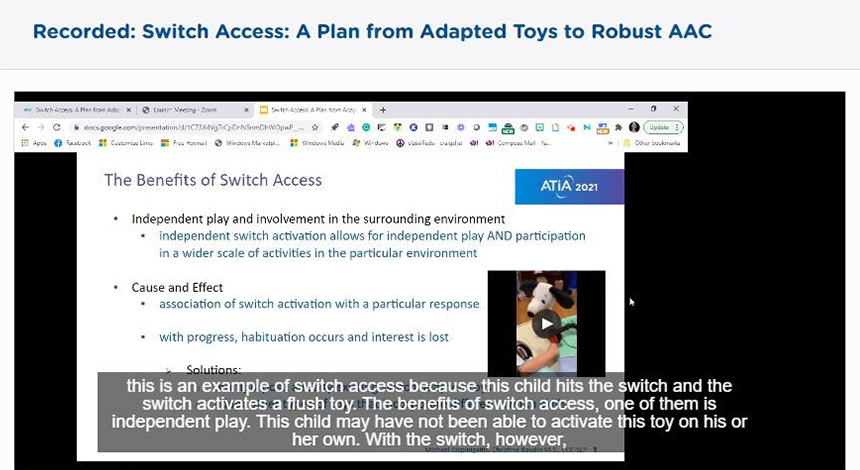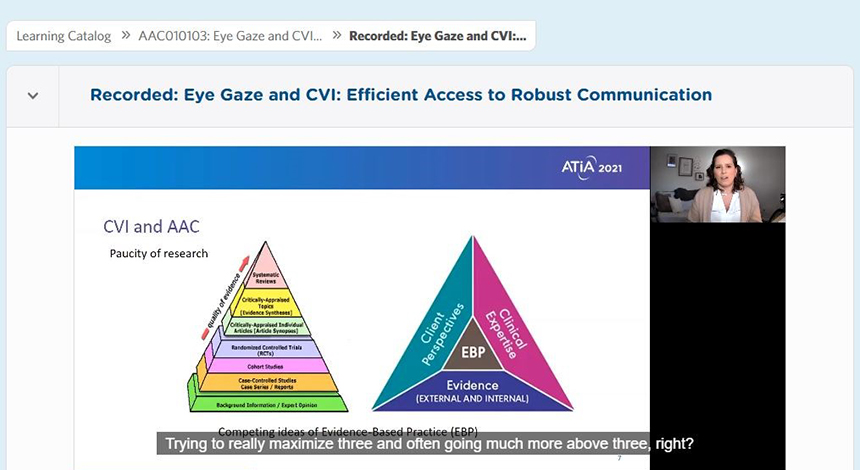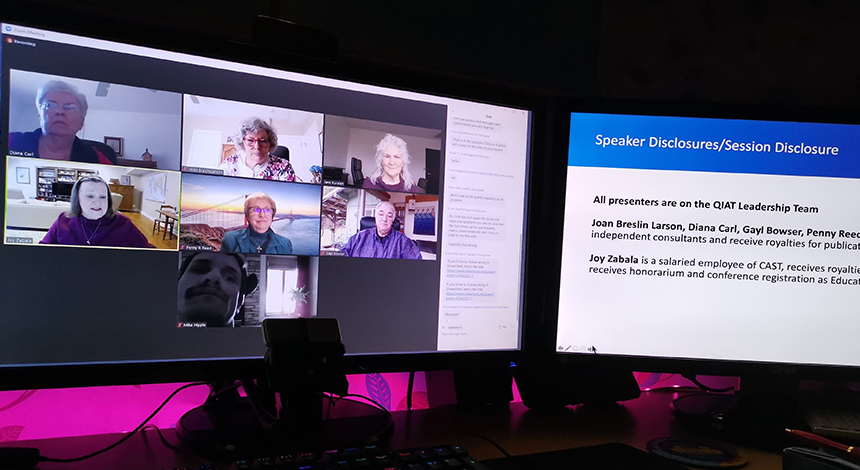
Ian Bean
Ian Bean is an AT specialist consultant with over 20 years of experience providing training and support to teachers and therapists involved in the education of young people with severe and complex needs.
“ATIA 2021 was everything I hoped for and more. I’d like to thank the conference organisers, strand advisors and presenters for an amazing conference experience. I learned so much”.
ATIA 2021
It’s almost seventeen years since I first became aware of the Assistive Technology Industry Association community and the ATIA conference. Each year, thousands of assistive technology practitioners, therapists, educators, parents, and caregivers come together to learn, network and share best practices in assistive technology. Every year I have planned to travel to Florida and attend the conference, sadly, I’ve never yet managed to make it happen.
Imagine my delight then at receiving the offer of a scholarship from the British Assistive Technology Association which included a full registration to the 2021 conference. COVID restrictions meant that the ATIA 2021 conference would be hugely different with all the presentations moving online however registration was quick and easy and I was soon perusing the long and interesting list of presentations and virtual workshops I could attend.
Presentations were grouped into four strands:
• Augmentative and Alternative Communication (ACC)
• Vision and Hearing Technologies
• Education and Learning
• At for Physical Access and Participation
Five sessions were available for each of the three major time slots; however each session was recorded so it was possible to attend one live session and watch the recordings of every other presentation in each time slot. No worries about missing out. Across each of the three strands the range of presentations available was deeply impressive. As I work primarily in special education supporting educators and therapists working with young people with severe, profound and complex additional support needs, I was keen to see what sessions were available to colleagues in my admittedly niche area of interest. I wasn’t disappointed.
For my first session, I joined 270 others for an interesting presentation from the AT strand delivered by Christine Baudin and Michael Dicpinigatis entitled, ‘Switch Access: A Plan from Adapted Toys to Robust AAC’ where, for half of the session, Baudin laid out one potential route for progression from experiential learning through to choice making using switch adapted toys. This mirrored many of the concepts demonstrated in the Learning Journeys: Switch Progression Road Map from Inclusive Technology so would be useful to UK schools looking to extend the breadth of their teaching practice. In the second half of the session, Dicpingaitis demonstrated some easily replicable methods for switch adapting toys. Particularly interesting was the discussion around 3D printing switches and Dicpingaitis shared several useful resources for those interested in making their own devices.

Another interesting session, this time from the AAC strand was ‘Eye Gaze and CVI: Efficient Access to Robust Communication’ delivered by Jennifer Clark, Emi Takeuchi and Sofia Benson- Goldberg. The session was presented through a series of case studies which clearly demonstrated their methodology, providing attendees with useful exemplars to try with their own students back in the classroom. It’s estimated that around 21% of children with neuro-genetic disorders experience Cortical Visual Impairment so research and examples of good practice such as this are important to colleagues everywhere, helping to reduce barriers to eye gaze access for students with complex needs. An informative and inspiring session and a huge thumbs up for the ‘presume competence’ movement.

Much of my work involves supporting special schools with assistive technology assessment and training services so I was interested so hear how other organisations have adapted to COVID restrictions by moving to more remote systems of support. There were many sessions to choose from across all of the strands and I’m still working my way through them. One particularly interesting presentation was ‘QIAT Conversations – Practical Quality Resources to Support your AT Services’ delivered by a team of presenters including Jane Korsten, Gayl Bowser and Joy Zabala. I’ve long been a member of the QIAT list server and recommend the SETT Framework wherever I travel so this was a no brainer. I have met both Joy and Jane on my travels around the world but never really had the time to hear them present.

I really enjoyed this session, hearing from colleagues how they were remotely supporting the schools they worked with. An amazing list of resources were shared, many of which were new to me and I spent a remarkably interesting few days downloading and evaluating them all.
I suspect that I was not alone in my reservations about ‘online’ conferences. I’m sure we’ve all experienced that moment when technology has let us down. With thousands of remote attendees, this was always going to be an enormous challenge for the conference organisers. I’m pleased to report that everything from accessing the website through to attending live sessions just worked for me and worked well. The organisers of ATIA 2021 rose to the challenge of providing a very comprehensive range of live and recorded presentations and workshops in an easy to navigate environment. Moreover, ATIA 2021 did not feel like an ‘online’ conference. I joined at least two ‘social’ sessions where the presenters and strand advisors made me feel welcome and a valued part of the discussion. This was something which addressed the very real lack of valuable networking afforded by other online conferences. As a hearing-impaired individual, I was really pleased to see that the live sessions were captioned, and the recorded sessions were subtitled. More technical challenges for the organisers but one which clearly demonstrates the inclusivity of the conference. I hugely enjoyed ATIA 2021 as it happened and I’m still enjoying working my way through the many recorded sessions. All of the recorded content is available to the end of June 2021 so there’s plenty to time to watch interesting presentations, even for those with busy schedules.
I’d like to thank Martin Littler and BATA for their very generous offer of a scholarship to attend ATIA 2021. It was everything I hoped for and more. I’d also like to thank the conference organisers, strand advisors and presenters for an amazing conference experience. I learned so much.
